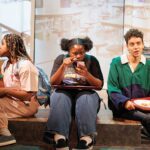“It is one measure of the depth and insidiousness of American racism that the nation ignores the rage of the rejected — until it explodes … The wonder is that here have been so few riots, that [black Americans] generally are law-abiding in a world where the law itself has seemed an enemy.”
Those words weren’t written about our current crisis in Baltimore. They were written 50 years ago by the famed black psychologist Kenneth B. Clark in his September 5, 1965 New York Times Magazine article discussing the stunning black uprising in the Watts neighborhood of Los Angeles.
Clark’s article about what was then seen as a shocking event underscores this about the present: It seems like déjà vu all over again.
Are we talking about what the “crisis” in Baltimore has revealed? Or the crisis that was revealed a decade ago in the aftermath of Hurricane Katrina? Or the crisis revealed by the Watts rebellion, or those in scores of other black ghettos that erupted throughout the late 1960s?
Are we talking about the culture of racist exploitation and violence that pervades the police department in Baltimore? Or the police department in New Orleans? Or Ferguson, Mo.? Or …. name a city or town.
Are we talking about our alarm at the sense of dispossession among Baltimore’s black poor that Freddie Gray’s death in police custody exposed? Or among the black poor in New Orleans in the aftermath of Hurricane Katrina? Or in the wake of the riots that swept parts of Los Angeles a quarter-century ago after the first Rodney King Trial? Or, yes, back to Watts in 1965, and Harlem the year before that?
What the crisis in Baltimore has exposed once again is the continual “racial crisis loop” of American society. It’s that repeating dynamic that gives the sense of having seen this entire scenario before.
And we have — because it’s rooted in the age-old struggle over whether black Americans should actually be allowed to exercise the rights of American citizens. For most of the four-century existence of blacks and whites on these shores, the answer to that question was: no.
The Civil War ended slavery. But it quickly became clear that white Americans would resist black Americans exercising their rights of citizenship. In fact, precisely because blacks “proved” again and again they were more than equal to the responsibilities of citizenship, their rights were under challenge, in the North as well as the South, all the way into the middle of the twentieth century.
The civil rights victories of the 1960s and blacks’ success in taking advantage of them didn’t end the dynamic of anti-black racism. Instead, along with the opening of mainstream America to blacks, it provoked another round of efforts to deny blacks their American rights. That’s why blacks’ ultimate political success — President Obama’s election and re-election — has provoked a fierce racist reaction championed by the Republican Party.
It’s vitally important to match both the personal and political reaction against Obama, on the one hand, with, on the other, both the current caught-on-video and the deeply researched revelations of police violence against black citizens in Baltimore and elsewhere. For they’re among the voluminous evidence that reveal the fortunes of both well-to-do blacks and poor blacks are under siege. The institutional and political resources devoted to creating and maintaining a sizeable class of poor black people whether in populous urban centers like Baltimore or small cities and towns like Ferguson become obvious at moments like this.
But we also shouldn’t forget that the striking success of blacks playing “smart politics” with their vote — that fundamental marker of citizenship — is what provoked the Supreme Court conservative majority’s to strike down the most important clause of the Voting Rights Act of 1965 in order to aid Republican efforts to block black Americans’ (and other Democratic-leaning voting blocs) right to vote.
That’s another example of why today’s blacks (and their allies) are right to have a sense of racial déjà vu at this moment — and why they’ve got to use that as inspiration to forge a successful response for the present and future.
Lee A. Daniels’ new collection of columns, Race Forward: Facing America’s Racial Divide in 2014, is available at www.amazon.com

![Banner [Virtual] Art Gallery](https://baystatebanner.com/wp-content/uploads/2024/05/PFW_3-150x150.jpg)




